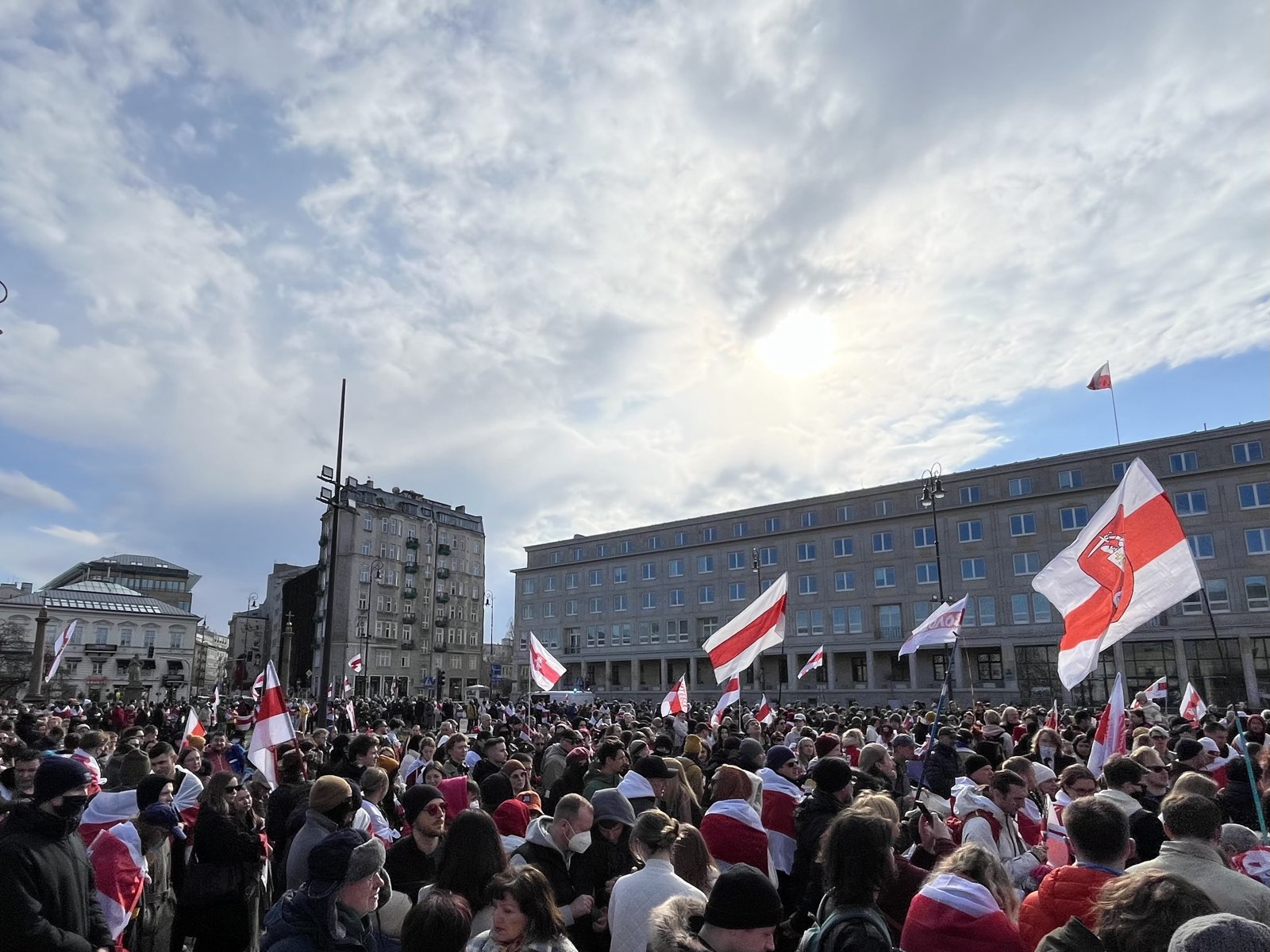Hand-drawn green leaves on a façade in Warsaw invite visitors into a space filled with the scent of Belarusian foods: ciasta, syrniki and pelmeni.
Open for two years, the Kawairnia Bialoruska bakery offers more than just the classics. It has become a small sanctuary for hundreds of exiles who fled the repression of President Alexander Lukashenko’s government. They share stories, laugh and remember Belarus.
The bakery is a reminder, exiled journalists told Capital News Service recently, that cultural preservation can start in the kitchen with a whisk, a rolling pin and a hot oven.

There are an estimated 250 exiled Belarusian journalists in Warsaw, according to Barys Haretski, deputy chairman of the Belarusian Association of Journalists. The members include journalists with Belsat TV, a satellite channel now operating out of Warsaw aimed at Belarusians.
The recent troubles began in 2020, when about 1,300 media professionals were members of the Belarusian Association of Journalists, Haretski said. That year President Alexander Lukashenko announced he had won a sixth four-year term in an election criticized as unfair by international observers.
Widespread protests followed, with demonstrators performing mock funerals and displaying red-and-white national flags.
During the protests, Zmicier Mickiewicz, a journalist for Belsat TV, said his outlet broadcast live. The government eventually cut off its mobile internet. Now, he, too, is in Warsaw.
“We talked to people who let us use their cable internet to broadcast from their balconies,” he said.
This innovative approach, which he dubbed “balcony analysis,” provided crucial information and fostered a sense of community and resistance among the people.
“In our country, when there is basically a civil war for independence and preserving national identity, being a journalist has always been a mission,” Mickiewicz said.
In response, authorities conducted mass arrests and brutal measures to disperse protesters. At least 500 to 600 journalists were forced to flee the country, with many arrested and detained.
To pressure Lukashenko’s government to release political prisoners and to weaken his authority, the United States, United Kingdom and Canada have imposed economic sanctions on key sectors including potash, oil and defense exports.
Lukashenko’s dependence on Russian economic and political support only deepened. Lukashenko publicly acknowledged that his country could not survive without Russia, raising concerns in the West about Belarus’s sovereignty.
In August 2021, Belarus severed diplomatic ties with the United States by revoking the U.S. ambassador’s appointment, signaling a marked deterioration in relations. Then, in February 2022, Belarus allowed the Russian military to stage part of its invasion of Ukraine in Belarus.
Since 2021, Belarus has imprisoned 55 journalists, according to Reporters Without Borders, an international advocacy group. Those imprisoned are frequently beaten and tortured by the police, according to the U.S. Department of State’s 2023 human rights report on Belarus.
Anton Trafimovich, 37, a Belarusian journalist who left in 2020 and now lives in Warsaw, said Belarus “banned attending the protest, saying, if you’re going, you are treated as protesters violating the law, and you would be detained, arrested. And this is how many [journalists] went to short-term arrest at the time. For some people, it resulted in several years.”
The Belarus Embassy did not respond to requests for comment.
A chilling effect in Belarus
While information and small talk flow freely at the little bakery in the Warsaw neighborhood, Belarusians at home have become distrustful of the government and each other, said Anastasia Pociumban, a research fellow at the German Council on Foreign Relations. Citizens are not sure who works for the government and are always wary about sharing information with neighbors and friends, she said.
“People don’t trust each other in the civil society sector, and this creates few opportunities for discussions, so it’s hard to understand what’s going on internally,’’ Pociumban said.
With few professional journalists able to practice inside the country, citizen journalists have stepped up to fill the void, Trafimovich said.
Telegram, an encrypted app, has become the main mode of communication for Belarusians in and out of the country, Trafimovich said.
Belarusians rely on encrypted platforms to access uncensored information, as directly following certain activists or organizations could lead to imprisonment.
“When you need to find something untold, you go on Telegram and just search because, if you follow them, you would go to jail,” Trafimovich said.
Maintaining culture
Among the traditions Belarusians are holding onto in Warsaw are traditional choirs. Last year, another male choir was added to the half dozen already active in the city.
Defiance in exile
In addition to traditional choirs, Belarusian exiles formed a football team in the Polish Cup. Trafimovich sometimes avoids football games because the police-controlled crowd reminds him of protests he covered in Belarus.
Trafimovich felt his safety was at stake when Belarusian police called his mobile phone in Sep 2020 to say he did not have the proper journalism accreditation from the Ministry of Foreign Affairs.
“I was actually sure I would end up in jail at least for 15 days,” he said.
Trafimovich stalled for time and told Belarusian police he would seek the proper license. Instead, he and his wife left the country using treatment tour papers to Ukraine he bought under the guise of fleeing COVID-19. But soon after they arrived in Ukraine, Russia invaded, and they had to leave again. This time, they went to Warsaw.
“Warsaw has the best conditions for Belarusians among all countries and the community here is very [welcoming],” Trafimovich said. “We have a little Belarus here: organizations, bars, festivals every single day.”



You must be logged in to post a comment.